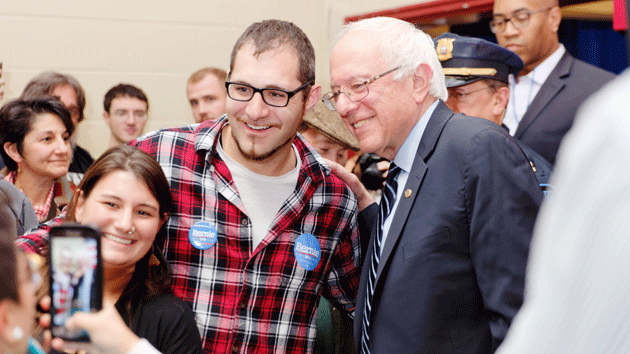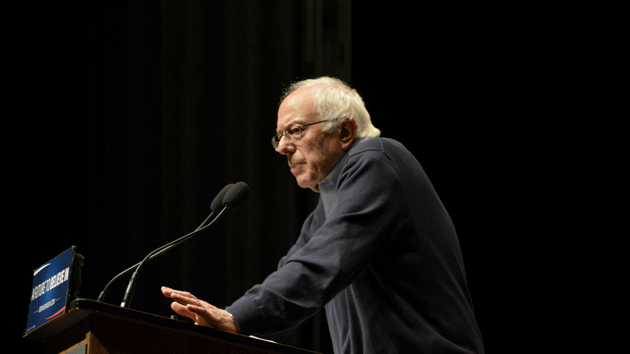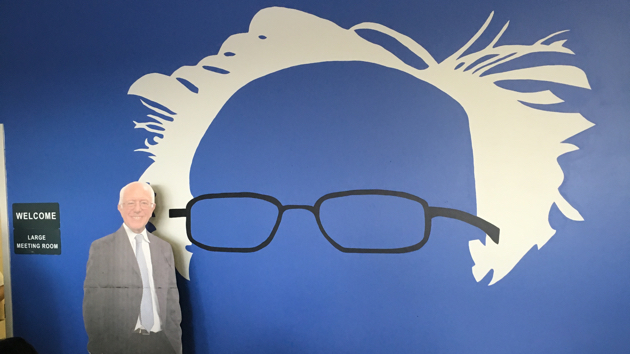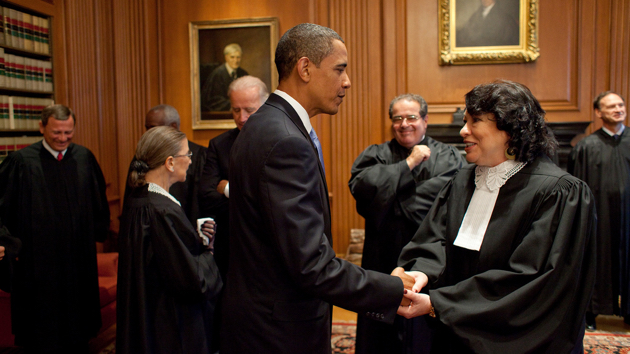
Bernie Sanders attends a town hall in Derry, New Hampshire, in October.<a href="https://www.flickr.com/photos/80038275@N00/22692557590/in/photolist-AzghLW-zV3oCc-y78Viv-yXUxDY-y3YXaJ-yXBn5f-y43Co6-yXZkZf-y481cD-yYXoMd-z1CMT8-y4rndk-yHisZ4-yHq1rv-yHyBs7-yHAe82-z1iAh4-yHh9my-yXwrDq-yHL9A6-z1bWMr-z25jYp-y3X8DJ-yZUq4p-y4fAzJ-z1Finp-yYQjAG-yHkxpy-yXzFJJ-z1fPUk-y4iDvX-yZjyAE-yHv5Gp-yZieF7-yZdVbj-yXGwbS-yHA1hb-y4dBfK-yHtP4S-y3MfN3-z28nKk-y4pKn4-y4imDF-y4qkGM-z1QoU8-y41kwe-yXEhq9-z1io7T-y4eSD9-yXHAAG">Michael Vadon</a>/Flickr
The latest polls in New Hampshire place Bernie Sanders ahead of Hillary Clinton by as much as 31 percent. And that prompts a technical question from political scientists: WTF?
That is, why is Sanders, the democratic socialist senator from neighboring Vermont, who only months ago joined the Democratic Party after decades as an independent, clobbering the front-runner? The facile answers tossed about are that Sanders is from a next-door state and, thus, has a home-field advantage, and that many of those flinty New Hampshire residents like to vote as contrarians and don’t mind sticking a sharp maple tree branch into the eye of the establishment. Here’s the problem: These explanations for Bernie-mania don’t make complete sense and are at odds with the voting history of the Granite State.
First, the neighbor thing. Candidates from nearby states often have an advantage in a primary because they start with high name recognition. Primary voters will usually know something about a senator or governor—or maybe a House member—from across the state line because media often crosses borders or simply because proximity does lead to familiarity. And there can be a sense a solidarity and regional pride (perhaps tempered with elements of rivalry) between the citizens of neighboring states. Yet folks I know in New Hampshire do say there’s no deep or special bond between them and those who live on the western side of the Connecticut River. Sanders may not pick up many points in New Hampshire for having long ago relocated from Brooklyn to the Green Mountain State.
As for being a local brand name, well, Hillary Clinton is as known as any politician. The odds may be zero or below that any New Hampshire Democratic voter possesses less information about her than Sanders. And consider this: Last spring, in a series of polls in New Hampshire, Clinton trounced Sanders by between 10 and 44 points. If Sanders’ next-door-enhanced name recognition did not help him at that point, there’s no cause to think it’s doing so now.
So perhaps those independent-minded New Englanders simply don’t cotton to rubber-stamping any establishment favorite? In other words, take that, Hillary, you latest running dog of the party elite! But this sentiment would be inconsistent with the historical record, since New Hampshire voters, on the Democratic side, have often bear-hugged the more establishment candidate.
Let’s go to the videotape. Last time there was a competitive primary, in 2008, an upstart named Barack Obama had just won the caucuses in Iowa, where Hillary Clinton, the choice of party insiders, had placed a shocking third. Days later, did New Hampshire further boost the maverick? No, it kept Clinton in the hunt. Voters there sided with the empire, and she beat Obama 39 to 37 percent. Flash back to 2004. Democrats in the state had the choice of two next-door favorite sons: Sen. John Kerry of Massachusetts and Gov. Howard Dean of Vermont. Dean was campaigning as the progressive insurgent; Kerry was seen as the establishment candidate. Whom did Granite Staters favor? By 12 points, Kerry, the guy backed by Washington, DC, Democrats.
Four years earlier, Vice President Al Gore was in a tough battle against former Sen. Bill Bradley of New Jersey. The ideological line between the two was not so sharp. But Gore, as an incumbent, represented the powers that be, and Bradley was running as a maverick looking to overturn the regular order. Bradley got close, but New Hampshire Dems (and the independents who voted in the Democratic primary) gave their seal of approval to the sitting veep; Gore won 50 to 46 percent.
There’s a distinct pattern: New Hampshire is not friendly territory for progressive outsiders. In 1992, former Sen. Paul Tsongas from neighboring Massachusetts won with 33 percent of the vote. But the big story that year was about Arkansas Gov. Bill Clinton, who was running as a so-called New Democrat (centrist Democrat with a tinge of Southern populism); he finished second with 25 percent of the vote after he was hit by the scandalous allegation he had engaged in an extramarital affair with Arkansas state employee and lounge singer Gennifer Flowers. By ending up toward the front of the pack, Bill Clinton was able to proclaim himself the “comeback kid,” and he greatly thanked New Hampshire for saving his political career. (Dems in the Granite State that year gave little support to the more progressive candidates in the large field: Sen. Tom Harkin of Iowa received 10 percent of the vote, once-and-future California Gov. Jerry Brown pocketed 8 percent.)
In recent decades, the only time that New Hampshire Ds fully embraced an outsider was in 1984, when Sen. Gary Hart of Colorado mounted a stunning defeat of former Vice President Walter Mondale. This result turned the race upside down. And it took a mighty effort on the part of the Democratic establishment to protect Mondale, who eventually beat back Hart’s charge. All told, the usual outcome in New Hampshire is that the preferred candidate of party regulars is fancied. And twice New Hampshire has rescued a Clinton who was close to extinction.
New Hampshire Democrats going gaga for Sanders is out of sync with this past. So looking for answers, I turned to Dante Scala, a political science professor at the University of New Hampshire who is an expert on the state’s political demographics. He said he was puzzled by Sanders’ over-the-moon showing in the polls. Noting the historical pattern, he said, “That’s exactly why I thought Hillary Clinton would be doing better than she is.”
Scala had a few possible explanations. He pointed out that for months last year, Sanders was promoting “a very positive, issue-based message without much pushback from the Clinton campaign.” This allowed the fiery populist to make a good impression on liberal and moderate Democrats in the state. “He’s a progressive insurgent,” Scala says, “but he’s doing very well among moderate Democrats.” Scala also observes that Sanders—especially when compared with past insurgent-y candidates, such as Obama, Bradley, and Hart—is winning over working-class male voters in the state. “This is out of the ordinary,” he comments, “especially for a progressive insurgent.” In 2008, Hillary Clinton’s core support in the primary was white, working-class voters. Their votes fueled her victory over Obama. (And in 1992, Bill Clinton did better with this group than Tsongas.) Scala speculates that in the wake of the Bush-Cheney recession, “this class of voters feels left behind”—and Sanders is addressing their worries and desires more so than Clinton.
There may be, Scala adds, another factor: guns. In New Hampshire, the Clinton campaign has been aggressively promoting her stance on gun safety, one of the few issues where she is more to the left than Sanders, who, as a senator from a rural state, has a mixed record on gun control. “Suburban well-educated moms in the southern tier think about Newtown and their husbands don’t go hunting,” Scala says. “But with working-class guys, this is a bit of a turnoff. Sanders is trying to appeal to these working-class voters, and he is not as anti-gun.”
And Clinton may have lost this crowd on another level, as she campaigns as the candidate who will continue Obama’s programs and Sanders positions himself as an agent of change. “Those working-class white male voters were not too fond of Obama in 2008,” Scala notes. “And Clinton was the anti-Obama in 2008. Now she’s wrapping the mantle of Obama around herself.” Ultimately, Scala’s explanations all boil down to this: Sanders has delivered a message that connected more solidly with New Hampshire Democrats of varying ideological strips than what Clinton presented.
Through much of last year, Scala says, he was sure Sanders would be competitive in the New Hampshire primary but believed he wouldn’t win, considering the state’s history. Now, he says, “it could be something different.” In fact, the overwhelming assumption these days is that Sanders will beat Clinton—and do so by a healthy margin.
This was not preordained. Sanders’ next-doorness did not afford him a tremendous edge over Clinton. And the nature of the state’s Democratic electorate was not automatically an advantage for Sanders—though the lack of African American and Latino voters may deprive Clinton of a bloc of supporters. At the start of this process, Clinton had as much a claim on Granite Staters as Sanders, if not more, and early polls reflected this. Though Clinton can certainly survive a loss to Sanders in New Hampshire and push ahead—the upcoming states, as every pundit has decreed, seem more favorable for her—she and her supporters cannot explain away a losing performance by pointing to the proximity of Vermont or the pre-existing proclivities of New Hampshire Democrats. Something else has been under way in the state, and, while Clinton’s prospects for nabbing the nomination remain strong, that’s not good news for her.








